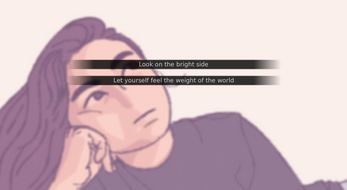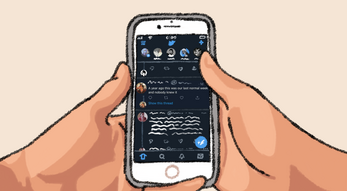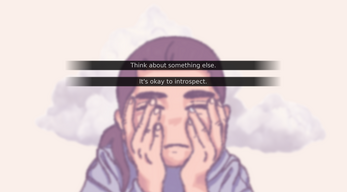How do I feel about coronavirus?
A downloadable reflection for Windows and macOS
My first completed visual novel. This is my final project for my course in Exploring Human-Computer Interaction.
See the comments for the additional/explanatory text I wrote for my instructors.
| Status | Released |
| Platforms | Windows, macOS |
| Rating | Rated 4.0 out of 5 stars (2 total ratings) |
| Author | castfire |
| Genre | Visual Novel |
Download
Install instructions
This is my first time completing and uploading a Ren'Py game. I don't know if there's a better way, but I uploaded the compressed files containing the builds.
If the files do not extract because the "path is too long" (that happened to me), try extracting them using 7Zip or something like that instead. It can handle long paths.
On Mac, the game should work as a single application. If the game doesn't open because it's an "unverified developer", try right clicking and selecting "Open". Or even restart your computer, I saw that work for someone in the forums. If all else fails, I have found that the game runs easily and successfully if downloaded from the itch desktop app.
On Windows, after extracting the game files, run covidconvos.exe.



Comments
Log in with itch.io to leave a comment.
I want to comment the additional description/explanatory text here, so the information's still here but the downloads don't get pushed so far down the page. Here it is--
Additional and Contextualizing Text (for assignment):
Inspiration and Purpose
I created this game to explore the realm of DIY games, the visual novel community, and the ethos of emotionally communicative/resonant games and use of the hyper-personal that stands next to the “Twine Revolution”; not using Twine in this case, but the other platform that dominates the democratized game-making space, Ren’Py.
As mentioned in my proposal, after exploring and defining this “niche” (for lack of a better word) that I’m drawn to through my annotated bibliography, I wanted to extend the theory and commentary into practice and follow the call to action of developers in this movement— making my own game to communicate something about my own experience, using the free tools at my disposal. While by nature the use of games and their systems to communicate unique and personal experiences has no single pattern to follow, I specifically looked to Mattie Brice’s comments and goals with her development of Mainichi (http://www.mattiebrice.com/mainichi/ and http://www.mattiebrice.com/postpartum-mainichi-how-personal-experience-became-a-game/) as well as following Anna Anthropy’s recommendations and ethos in her book Rise of the Videogame Zinesters. Anthropy’s book serves as exactly the beginners guide for games of this niche which is why I referred to it, and I referred to Mattie Brice’s approach specifically as her game, while referenced in the bibliography, is one I was already personally familiar with and admired— it was the first game in this “genre” that I ever played, several years ago, and it is what brought me into loving this topic. It even inspired me to attempt a game of my own at that time, though it was never finished. As I find her game to be a shining example of what I was trying to study, I looked at her words when making a game of my own. Specifically, in my work on this project I was inspired by her comment: “I made a game that only I could make”. This is the full passage, almost her thesis statement for Mainichi— the closest thing to a rubric for me to follow with what I wanted to accomplish with this project:
“I still had something to say, or rather, something I didn’t know how to say. I had something I needed others to play. This is how Mainichi was born. It was an experiment in translating a personal experience into game mechanics, and also a push to prove to myself that I can make a game, even if the video game industry wouldn’t accept me. I want Mainichi to be a call to arms, a triumph of the personal. I made a game that only I could make, and I’m hoping this exercise empowers others to express a life that is uniquely theirs.”
To follow the example of the developers and the spirit of their games cited in my bibliography, I used the visual novel engine Ren'Py to create a game exploring my own experiences and feelings, specifically in reference to coronavirus isolation. There are several tools and game types characteristic to the movement explored in the bibliography, but for this project I wanted to just explore one of the platforms and approaches discussed. I decided to do a visual novel that focuses on emotions, not only because that is a common exemplar of the genre, but because I tried to make one based on similar inspiration in the past. With greater knowledge of the game “genre” and its background, I wanted to revisit Ren’Py.
Scope of Ren'Py
I will provide more context on Ren’Py as a platform and what I chose to use in order to show more clearly how a project like this is an exercise in HCI.
A game in Ren’Py can be stripped down to essentially just a “choose-your-own adventure” book or a kinetic novel, but the games are all built through underlying code, using Python and Ren’Py’s own unique scripting language. My game uses dialogue, images, transitions and choice menus, but as a platform Ren’Py provides much more opportunity beyond that. A developer can customize their game and its interface essentially to the point where it no longer looks like the “packaged” Ren’Py game— there is full capability for customization of GUI and the game’s visual interface; custom sounds and sound effects; a fully custom menu and even complex image, language, screen and other options accomplished through code, such as mapping buttons to an image. My game is already more fleshed out than perhaps it “should have” been, i.e. I wrote a lot of content and created artwork as well as coding transitions, but within the scope of Ren’Py it is definitely bare bones; I’ve added no sound, or customization of the interface beyond the default that Ren’Py provides.
To provide more context on Ren’Py as a program, an application: the Ren’Py program itself is just an engine. It exists in the form of a launcher, which shows all of the projects you have in your directory. From that launcher menu you can open the directories of your game, such as the images or GUI assets, as well as opening up the specific files that make up the game like the script file, which contains the code for the game. The Ren’Py launcher itself is only a workspace for your games; from the launcher you can export your games and create distributable builds, that is how you create a publishable and playable version of the game. From there, your work can be shared or uploaded wherever you like. The Ren’Py engine/launcher itself does not have the capacity to play other peoples’ games, unless you decompile them and add them to your Ren’Py directory. It is moreso a workspace for your projects, from which you launch off.
Connection to Class
In talks with Jennifer, she connected this project to the class topic of augmenting human intellect. I think, in addition to the class topics exploring empathy, persuasive technology (i.e., use of technology for an emotional purpose), and even informal/distributed mentoring as far as the “movement” and community is concerned, her assessment is apt.
While this exercise in creating a visual novel, to connect better with myself as well as maybe resonate with others, is not “augmenting human intellect” in the expected sense, I think it as well as the emulated genre itself may qualify. What’s interesting about creating a game like this is that in some ways, it’s just a sounding board for my own thoughts— as the developer, I’m more interested in the experience of others and if it manages to be relatable or help them reflect— but in practice, it was actually an arena for sense-making within myself; and if sense-making is a part of augmented intellect, then I suppose this project qualifies. More than I initially expected, the literal process of construction for this game required me not only to record my disparate thoughts and attitudes, but follow them through to their end, actually go face-to-face with them and explore them to their full ends. When we go down different trains of thought we are making choices, but they’re instantaneous, we slide into them. Having to separate those same thoughts into concrete, coded narratives allowed me to distance myself from these emotions; I was not engaging with them purely in the emotional moment, but rather curating them, dissecting them, analyzing them. The game not only represents trying to make sense of one’s feelings during Coronavirus, but in the creation of this game, it actually allowed me to make better sense and have perspective on the feelings myself.
Show post...
GOOD VN GAME DEV
OMG, thank you so much!!